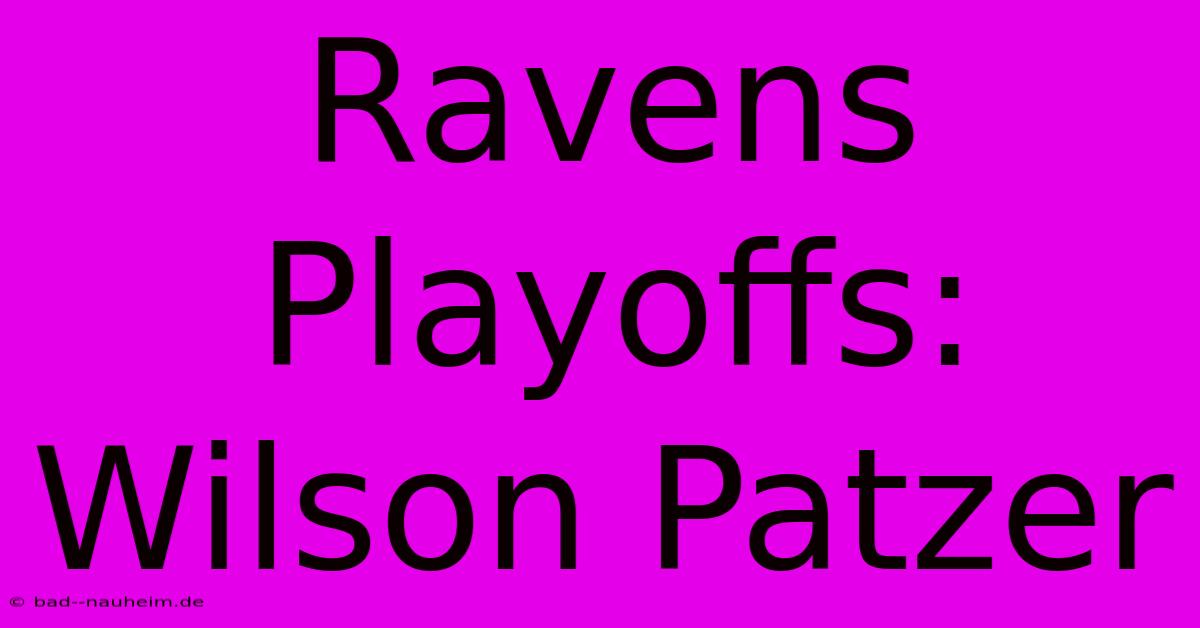Ravens Playoffs: Wilson Patzer

Discover more detailed and exciting information on our website. Click the link below to start your adventure: Visit My Website. Don't miss out!
Table of Contents
Ravens Playoffs: Wilson's Patzer Performance and the Road Ahead
The Baltimore Ravens' playoff hopes took a significant hit with Lamar Jackson's injury, thrusting Tyler Huntley into the starting role. However, even with Huntley's solid performances, the Wild Card round loss against the Cincinnati Bengals highlighted a critical weakness: inconsistent quarterback play, particularly evident in Tyler Huntley's performance, often referred to as a "patzer" by some frustrated fans. Let's analyze Huntley's performance, explore the reasons behind the inconsistencies, and examine how the Ravens can address this crucial aspect moving forward.
Huntley's Wild Card Round Performance: A Closer Look
Huntley's game against the Bengals wasn't a complete disaster. He showed flashes of brilliance, displaying his mobility and making some crucial throws. However, crucial mistakes, especially in high-pressure situations, ultimately cost the Ravens the game. These errors, the "patzer" moments, significantly impacted the team's ability to capitalize on opportunities and maintain momentum. Turnovers, missed opportunities in the red zone, and inconsistent accuracy under pressure were key factors contributing to the disappointing outcome. Specific instances of poor decision-making will be remembered by fans for some time.
Analyzing the Root Causes of Inconsistent Play
Several factors could contribute to Huntley's inconsistent performance. One significant aspect is experience. While Huntley has shown potential, he lacks the extensive game experience of a seasoned starting quarterback. The pressure of a playoff game, particularly against a strong opponent like the Bengals, can amplify these inexperience-related issues.
Another crucial factor is the offensive line's performance. A consistently pressured quarterback is more likely to make mistakes, impacting accuracy and decision-making. The offensive line’s struggles in protecting Huntley contributed significantly to his struggles throughout the game.
Finally, game-planning and play-calling deserve scrutiny. Were the offensive schemes designed to maximize Huntley's strengths and minimize his weaknesses? Did the play-calling adapt to the changing game dynamics effectively? These are crucial questions the coaching staff needs to address in the offseason.
The Road to Improvement: Lessons Learned and Future Strategies
The Ravens must learn from this playoff experience. Addressing quarterback inconsistency is paramount. This involves several key steps:
- Strengthening the Offensive Line: Investing in the offensive line during the offseason is crucial. A solid, reliable line will significantly reduce pressure on the quarterback, regardless of who starts.
- Offensive Scheme Refinement: The offensive game plan needs to be tailored to better suit the quarterback's abilities. This requires careful analysis of both Huntley's strengths and weaknesses, as well as strategic flexibility during game situations.
- Continued Development of Huntley: While acquiring a veteran quarterback remains a possibility, the Ravens shouldn't discount Huntley's potential. Dedicated coaching, focused practice, and strategic game experience are vital to improving his consistency and decision-making under pressure. The "patzer" label can be shed with focused effort.
- Contingency Planning: The team needs a plan B in case of injuries, either by drafting a capable backup or making a strong free agent signing.
The Ravens' playoff exit highlighted the need for improvements, particularly at the quarterback position. While the "patzer" label is harsh, it points to a real area of concern. Addressing this issue will be crucial for the Ravens’ future success and their chances of a deep playoff run next season. The offseason provides an opportunity for reflection, adjustments, and preparation for a stronger campaign in the future.

Thank you for visiting our website wich cover about Ravens Playoffs: Wilson Patzer. We hope the information provided has been useful to you. Feel free to contact us if you have any questions or need further assistance. See you next time and dont miss to bookmark.
Also read the following articles
| Article Title | Date |
|---|---|
| Ffh Praesentiert Loi Mit Left In Your Love | Dec 22, 2024 |
| Playoff Einzug Baltimore Ravens | Dec 22, 2024 |
| Bully Rettet Den Tag | Dec 22, 2024 |
| Remis In Hannover 96 Gegen Hertha Bsc 0 0 | Dec 22, 2024 |
| Rekordgewinn El Gordo In Madrid | Dec 22, 2024 |
